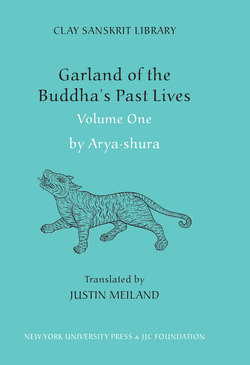Читать книгу Garland of the Buddha’s Past Lives (Volume 1) - Aryashura - Страница 22
На сайте Литреса книга снята с продажи.
Оглавлениеstories express “a preoccupation with proper political rule,” whereby niti, politics based on personal gain (artha), is to be replaced by virtue (dharma). This is, for example, expressed in “The Birth-Story of Vishvan·tara,” in which the prince gives gifts, “unswayed by the falsehood of politics” (9.22 [10]). The ideal king should experience the pains and pleasures of his people as if they were his own (8.4 [1]) and should carefully guard his moral conduct since his behavior is imitated by his subjects (13.87 [38], 17.10 [4]). Meadows suggests that this preoccupation with advising kings “reflects a courtly milieu” (ibid.) for the “Garland of the Buddha’s Past Lives.” Whether or not one accepts this argument, it is certainly the case that the notion of an ideal king who sacrifices everything for virtue is a prominent theme. In particular, this virtue is an absolute form of morality based on renunciant values of non-anger and non-desire, the direct opposite of the stereotyped behavior of the kshatriya class.
While kings are to incorporate renunciant values within their role as social paradigms, other stories express an antagonism between renunciation and society through the figure of the ascetic. This is particularly expressed in stories 18–20 which criticize the desire-based life of the householder in favor of asceticism. In “The Birth-Story of the Childless Ascetic,” for example, the Bodhi·sattva states:
The household life is a great discomfort,
for both the wealthy and the poor.
The wealthy suffer the toil of guarding money,
the poor suffer the toil of acquiring it.
As there is no happiness in such a life,
